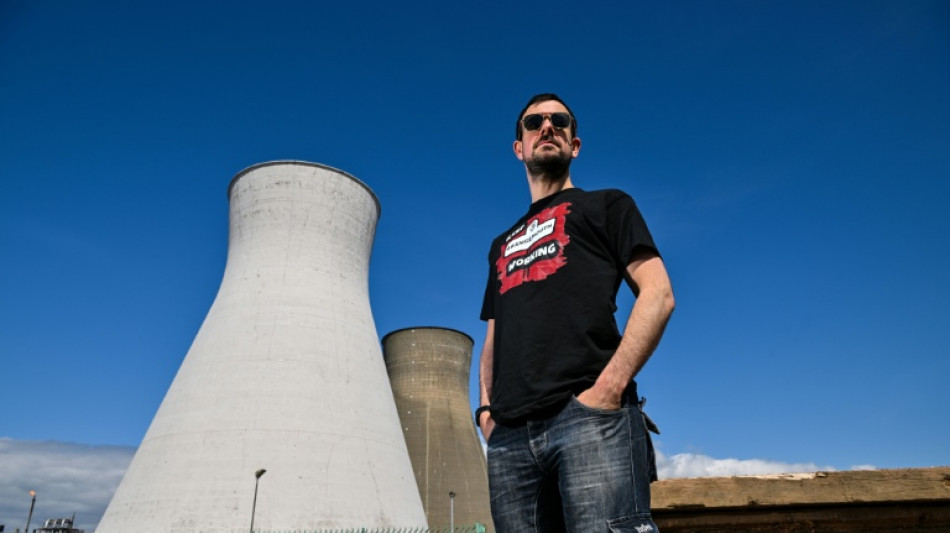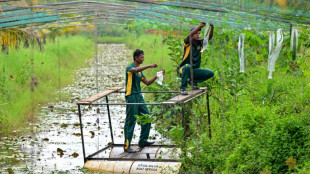

Scottish refinery closure spells trouble for green transition
Andrew Petersen is a third-generation oil refinery worker from a small, industrial Scottish town.
When he was growing up, working at Grangemouth refinery meant you "had a job for life".
But last month "everything changed", Petersen told AFP near the refinery, its giant cooling towers looming in the background.
On April 29, owner Petroineos announced it had ended operations at the refinery after more than a century, triggering the first of a phased wave of redundancies, including Petersen's.
The closure of the UK's oldest and Scotland's only refinery will result in more than 400 job cuts, which locals say the impoverished adjoining town of Grangemouth can ill afford.
Petroineos -- a joint venture of British chemical giant Ineos and the Chinese state-owned PetroChina -– says the refinery was losing around $500,000 (£376,600) a day as a result of changing market conditions and carbon-cutting measures.
It will be replaced by an import terminal, employing just 65 of the workforce including Chris Hamilton, who currently works as a refinery operator.
Since Petroineos announced its intention to wind down operations in 2023, workers like Petersen and Hamilton who are members of the Unite trade union have been campaigning to "Keep Grangemouth Working".
The campaign was not against ending polluting refinery work, but sought to "future-proof" the site and transition to low-carbon options such as Sustainable Aviation Fuel (SAF) without job losses, explained Hamilton.
However, Petroineos told AFP the "existing regulatory, policy and fiscal framework did not support low-carbon manufacturing" at Grangemouth, or any of the UK's other industrial clusters.
A recent report by Scotland's Just Transition Commission (JTC) concluded that Grangemouth had seen an "accountability breakdown" on the part of the government and Petroineos.
As a result, for the last six months, Petersen and his colleagues have been shutting down the refinery's units one-by-one.
"It was really tough," said Petersen. "You got the feeling you're almost digging your own grave."
- Just transition -
Located between Glasgow and Edinburgh on the Firth of Forth, the refinery, which first opened in 1924, is part of a sprawling industrial site.
Petroineos and the UK government this year published Project Willow, a feasibility study into low-carbon futures for the site.
However, its suggestions -- including SAF production or plastic recycling -- would take years to implement and billions of pounds of investment.
And £200 million pledged by the UK government for the site is contingent on private investment, which is not yet forthcoming.
"With the refinery closing... workers can't wait a decade," Grangemouth's Westminster MP Brian Leishman told AFP.
"A real, proper, just transition means that you take the workers and their communities along with you," he added.
JTC commissioner Richard Hardy told AFP that the refinery's "car crash" closure was a "litmus test for just transition".
He argued that the UK and devolved Scottish governments needed to do more to bridge the gap between shuttering polluting industries and the transition to greener energy -- which will accelerate closer to Britain's 2050 net zero target.
Just last month, the UK had to step in to save hundreds of jobs at a British Steel plant after its Chinese owners decided to shut down the furnaces.
Leishman had called for the government to do the same for Grangemouth.
One of the UK's six remaining crude refineries, Grangemouth was the primary supplier of aviation fuel to Scotland's main airports and a major petrol and diesel supplier in the central belt.
"Being in charge of our own destiny, for me, that's just plain common sense," said Leishman.
- 'Ghost town' -
Built around the refinery and once known as Scotland's "boomtown", Grangemouth has seen a steady decline in recent years.
The population has fallen in the last decade to about 16,000 residents, with more expected to leave with the refinery's closure.
Petersen said he would likely move elsewhere, and had even considered the Middle East.
There are options there, he said: "But just not here.
"It's going to turn into a ghost town," he added.
In the run-down town centre dotted with half-shuttered shop fronts, the local butcher Robert Anderson said he was already losing business.
"We don't see them anymore", he said of the workers in their high-visibility vests.
Hannah Barclay, a homelessness support worker, told AFP that the refinery employed many of her friends.
For a "lot of people here, uni and college and further education, it is not an option," said the 19-year-old.
The refinery closing is "taking away so much opportunity for people", and leaving behind an "uncertain" future.
"It's just quite disheartening to see all these young people who should be really excited for the future, who are just scared."
T.al-Najjar--BT




